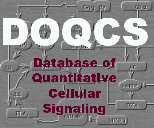
|
Enter a Search String | | Special character and space not allowed in the query term.
Search string should be at least 2 characters long. |
Molecule Parameter List for IP3 | The statistics table lists the distribution of a molecule acting either as a substrate, product, enzyme or as a molecule within the network.
The text color of a molecule is highlighted by  color. color. | | Statistics |
Accession and Pathway Details | |
| Accession Name | Accession No. | Accession Type | Pathway Link | NonOsc_Ca_
IP3metabolism | 31 | Network |
MIPP, CaMKII, CaM,
PKC, IP3-3K, CaRegulation,
Gq, PLCbeta, 134_dephos,
145_dephos, IP4-system, IHP-system,
1345_dephos | | This network models detailed metabolism of Ins(145)P3, integrated with GPCR mediated PLCbeta activation and Ca release by the InsP3 receptor in the neuron. It is similar to the NonOsc_Ca_IP3metab model (accession 23) except that some enzymes have been modified to have reversible kinetics rather than Michaelis-Menten kinetics. These modified enzymes belong to the groups: IP4-system, IP3-3K, 145_dephos and 134_dephos. Mishra J, Bhalla US. Biophys J. 2002 Sep;83(3):1298-316. |
IP3 acting as a Molecule in NonOsc_Ca_IP3metabolism Network
IP3 acting as a Summed Molecule in NonOsc_Ca_IP3metabolism Network
IP3 acting as a Substrate in a reaction in NonOsc_Ca_IP3metabolism Network
| Kd is calculated only for second order reactions, like nA+nB <->nC or nA<->nC+nD, where n is number and A,B,C,D are molecules, where as for first order reactions Keq is calculated.
Kd for higher order reaction are not consider. |
| Name | Accession Name | Pathway Name | Kf | Kb | Kd | tau | Reagents | | IP3Rbind | NonOsc_Ca_
IP3metabolism
Accession No. : 31 | CaRegulation
Pathway No. : 149 | 0.05
(uM^-3 s^-1) | 1
(s^-1) | Kd(af) = 2.7144(uM) | - | Substrate
IP3
IP3
IP3
IP3R
Product
IP3R*
| | Based on Lauffenburger and Linderman 1993 Receptors pg 200. The binding of IP3 on this reaction had a Hill coeff of 3. The eqns of Mahama and Linderman (cited in the book as 1993 a) are equivalent to the binding all occurring in a single step, so that is how I do it in this version. Their Ki1 is 0.07 uM. Lots of other data sources: Ramos-Franco et al, Biophys J 75, 1998: 834-39 have Ca sensitivity curves. At 250 nM free Ca, the EC50 for type1 is 58 nM and type 2 is 194 nM. Type 3 would be about 2 uM according to Newton et al, JBC 268(46), 1994: 28613-19. For the purposes of this model we use a Kd of 2.7 uM which is high but maybe OK at low calcium. The details of Ca interaction with the IP3R are not included in this model. |
| Database compilation and code copyright (C) 2022, Upinder S. Bhalla and NCBS/TIFR
This Copyright is applied to ensure that the contents of this database remain freely available. Please see FAQ for details. |
|
